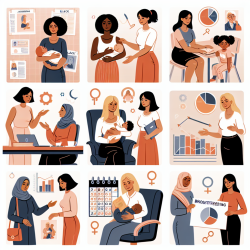The intricate relationship between breastfeeding, women's rights, and economic empowerment is a topic that requires careful consideration. The recent research paper "Breastfeeding and infant care as ‘sexed’ care work: reconsideration of the three Rs to enable women’s rights, economic empowerment, nutrition and health" highlights the need to redefine breastfeeding within the framework of women's rights and economic policies.
The Three Rs: Recognize, Reduce, and Redistribute
The established framework for addressing women's inequitable unpaid care work involves recognizing, reducing, and redistributing this work. However, breastfeeding presents a unique challenge. Unlike other forms of care work that can be redistributed to others, breastfeeding is inherently tied to female reproductive biology. As such, it should be recognized as 'sexed' care work that requires support rather than reduction.
Supporting Women’s Reproductive Rights
Breastfeeding should be viewed as a part of the reproductive continuum that includes pregnancy and childbirth. It is essential for policies aimed at promoting gender equality to consider the impact on women’s ability to breastfeed. This involves ensuring that initiatives do not undermine women’s human rights or their ability to breastfeed effectively.
Policy Interventions for Supporting Breastfeeding
- Maternity Protection: Comprehensive maternity protection is crucial for supporting breastfeeding. This includes paid maternity leave aligned with WHO recommendations for exclusive breastfeeding for six months.
- Workplace Accommodations: Providing breastfeeding breaks and facilities for expressing and storing breastmilk are essential supports that can facilitate continued breastfeeding upon returning to work.
- Paternity Leave: While encouraging fathers to take paternity leave is beneficial for family bonding, it should not come at the expense of maternity leave necessary for breastfeeding support.
The Economic Value of Breastfeeding
Recognizing breastfeeding as economically valuable care work is critical. Time-use data should accurately capture the work involved in breastfeeding to inform policy development. Including breastmilk production in GDP calculations could significantly alter perceptions of economic progress and highlight the true value of this unpaid care work.
Conclusion
The reconceptualization of breastfeeding as 'sexed' care work calls for policies that support rather than undermine this vital aspect of women's reproductive rights. By focusing on substantive equality that acknowledges sex differences, we can better support women’s health, nutrition, and economic empowerment while promoting gender equality. To delve deeper into this topic, practitioners are encouraged to read the original research paper by following this link: Breastfeeding and infant care as ‘sexed’ care work: reconsideration of the three Rs to enable women’s rights, economic empowerment, nutrition and health.










